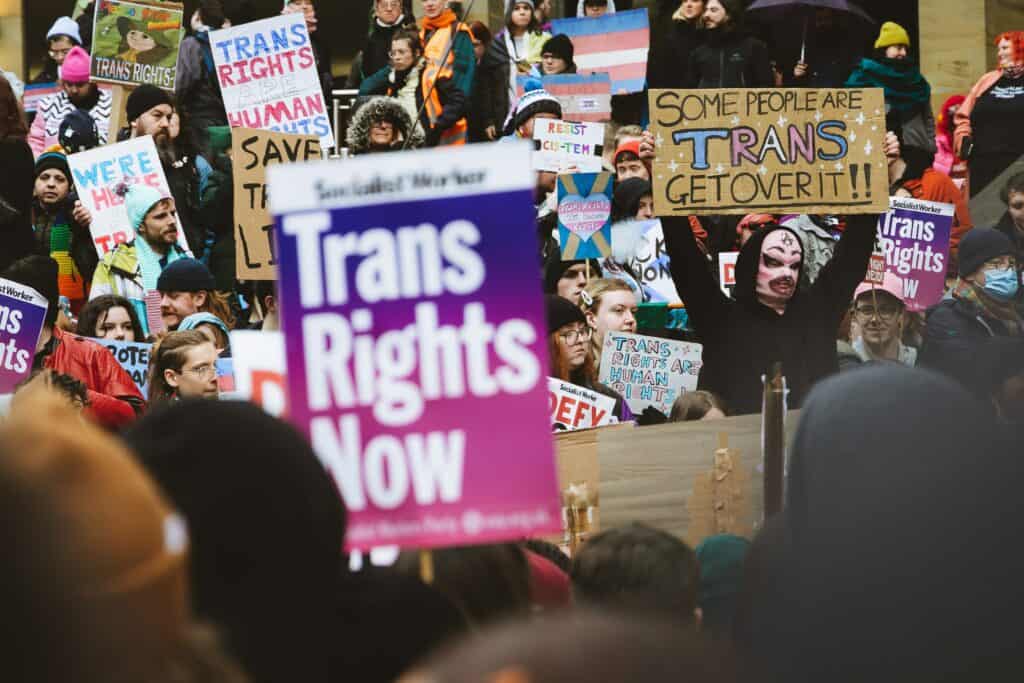Summary
In recognition of Pride Month this June, this piece details the special threats to health equity that haunt the transgender community.
Each June, the LGBTQ+ community celebrates Pride Month in a wide variety of ways – many joyous. But as we celebrate Pride this month, we must also remember the LGBTQ+ community still does not enjoy the full range of opportunities to earn wealth and live well that others may take for granted. This is especially true in measures of health equity.
The National Community Reinvestment Coalition (NCRC) defines health equity as the attainment of the highest level of health for all people in a community, valuing everyone equally. The United States is far from achieving true health equity in many ways – including for the communities celebrating Pride Month, and especially for transgender Americans.
Transphobic lawmakers across the nation are pushing anti-trans bills to restrict healthcare access for transgender Americans, with threats ranging from jail time to the suspension of medical licenses to the removal of children from their families.
As of May 31, the eve of Pride Month 2023, some 555 anti-trans bills had been introduced in 49 states. Seventy-one have already been signed into law. Many target “gender-affirming care,” a category of therapies ranging from counseling to medications to surgery. Surgeries are the final step of gender-affirming care and are uncommon among individuals under 18. Many anti-trans bills mainly target nonsurgical forms of gender affirmation.
In Oklahoma, SB129 pushes for bans on gender-affirming care past childhood and until the adult age of 26. Florida law now allows the state to take children from their families if they have received gender-affirming care in the past, bans doctors from providing such care going forward and gives courts the ability to retract physicians’ licenses for “conspiring” to provide prescriptions or procedures. And in Arkansas, physicians who provide gender-affirming care to children are now open to litigation for 15 years after the care takes place, despite the already-existing limitations on surgeries and treatment of very young children.
This national assault on healthcare access targets a community already suffering dire negative effects of health inequity and oppression. One in five transgender people have been homeless at some point in their lives. Between 20% and 40% of trans youth have experienced homelessness. Transgender people are four times more likely to be victims of violence compared to cisgender people, meaning those whose identities match the gender they were assigned at birth. While 2% of all Americans attempt suicide, 41% of transgender adults have attempted suicide. Such disparities are even more intense for individuals at the intersection of two persecuted identities. Transgender people of color have even higher rates of self harm compared to White trans peers. Five out of every six trans people killed in the US since 2013 were people of color. State anti-trans bills will only create more dire circumstances for a group of Americans whose lives are already in grave danger.
The emotionally charged nature of public discourse around trans rights can sometimes crowd out discussion of the material deprivation and tangible economic precariousness of life for transfolk. Trans people and others identifying as LGBTQ+ experience dire circumstances across various measurable categories of data which NCRC includes in our definition of the social determinants of health. Non-medical factors like housing, food access and economic opportunity all shape a person’s health outcomes.
Members of the LGBTQ+ community are disproportionately likely to live in poverty. High proportions of LGBTQ+ adults suffer from food insecurity. NCRC’s report on same-sex couples and mortgage lending found that such couples pay higher closing costs and interest rates than different-sex couples. The overall poverty rate for LGBTQ+ individuals is 35% higher than heterosexual and cisgender individuals. Transgender people of color fare worse when it comes to measures of wealth-building: Black trans people have an unemployment rate twice as high as the rate for Black people as a whole, and four times higher than the overall US unemployment rate.
With these facts in mind, it is important to be aware of how legislation restricting access to healthcare heightens barriers to trans people’s well-being that are already extreme. Everyone, especially communities already facing so much discrimination, should be able to count on accessible and adequate healthcare. As various public policy actors pay greater attention to the intersection of economic structures and health outcomes, they should take special account of the particular plight of the trans community. A full and meaningful national conversation about trans rights is only possible if it accounts for the material inequities that vulnerable communities experience in health and wealth.
Magdalena Mysliwiec is NCRC’s Health Equity Specialist.
Photo by Thiago Rocha on Unsplash



